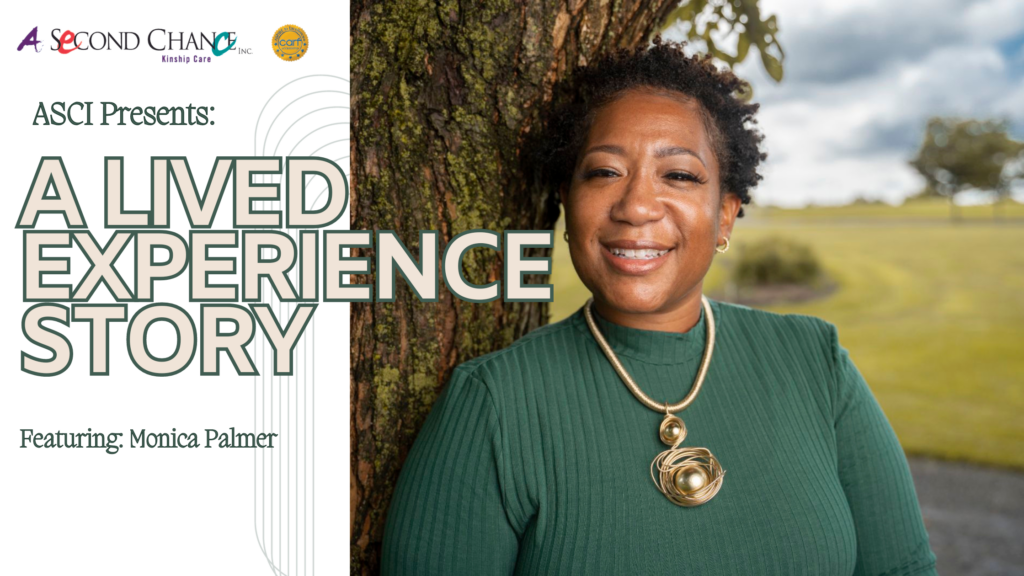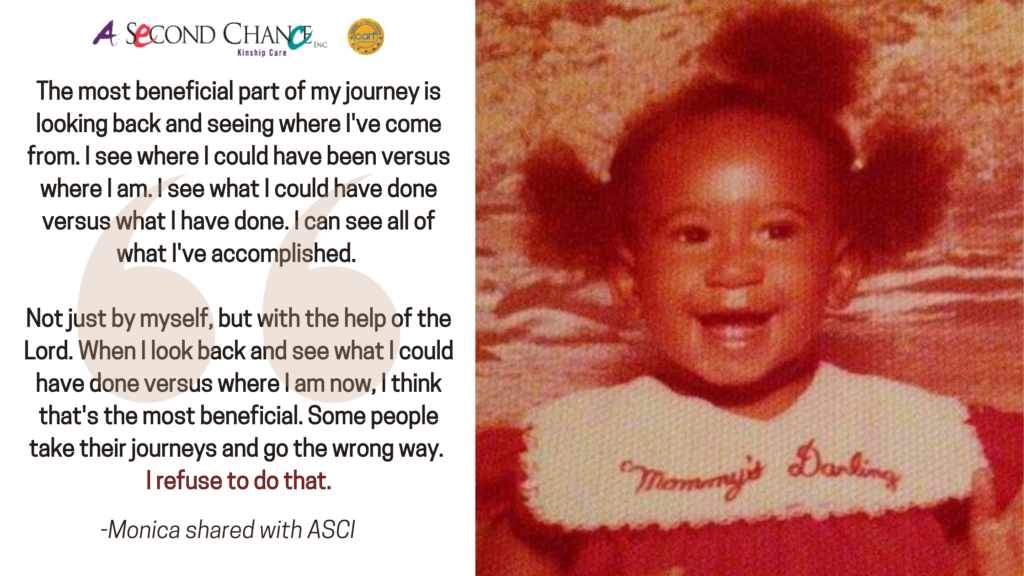Blog
A Lived Experience Story featuring Monica Palmer
Each month, A Second Chance, Inc. amplifies the voices of our kinship families through Q&A-style discussions. As an agency committed to establishing a safe, secure, and nurturing environment for children entrusted to the care of relatives or close family friends—known as kinship care—we recognize the importance of delving into the lived experiences of caregivers, birth parents, and children. By doing so, we aim to glean irreplaceable insights that contribute to authentic narratives and inform meaningful programming. Through these dialogues, we strive to foster understanding and create a supportive community for kinship families. This month, we had the privilege of engaging in a conversation with Monica Palmer, who graciously shared her triumphant adoption story.

Monica Palmer’s adoption journey is a unique tale of resilience and triumph over challenging circumstances. Faced with a mother struggling with addiction, Monica found herself in the midst of the child welfare system. Her mother, recognizing the need for change, took a courageous step by calling for help. However, the stigma associated with child welfare services prompted Monica to run away when she learned of their involvement. Seeking refuge with a compassionate woman, Monica’s life took a turn as her mother signed over her rights, leading to Monica’s adoption.
Reflecting on her past, Monica acknowledges that kinship care can be beneficial if a supportive family is available. She believes her life could have taken a different path had her adoption not occurred.
“If you have a great family that’s going to take care of the child, that’s exactly where the child should go. I didn’t have a family member to step up, but I think that my life would’ve turned out differently because their standards of living weren’t the same as mine.” Monica told ASCI.
The journey was not without difficulties, and forgiveness emerged as the most difficult hurdle to overcome. The most challenging aspect of Monica’s journey has been forgiveness— a process she describes as painful, costly, and sometimes more hurtful than the actions themselves. However, through true forgiveness, Monica has found healing and a renewed sense of purpose.
She shared, “I think learning true forgiveness is not just for your right now. Learning how to forgive and executing it helps any mental battles we face. Forgiveness is such a powerful tool that everyone needs to learn in order to have a better future.”
Looking back on her life, Monica’s introspection reveals the most significant benefit of her journey – the realization of where she could have been compared to her current achievements. She acknowledges the influence of her early experiences on her mental health, emphasizing the importance of therapy for children in similar situations. She is intentional about her mental health, attending therapy regularly and viewing it as a necessity for personal well-being.

Monica’s accomplishments, both spiritual and academic, stand as a testament to her growth. Her motivation stems from her faith and the choices she makes to break free from negativity. Her relationship with her mother has evolved into a great bond, emphasizing the importance of love, respect, and forgiveness.
“I was so wounded and so hurt about how everything happened. I started to develop a strong dislike for my mother. But my adoptive mom wouldn’t let me disregard my biological mom. She wouldn’t let me throw her way.” Monica continued, “She wouldn’t let me disrespect her. She would always say, “No matter what, she’s still your mom.” She was always making sure that love and respect still stayed there. When I allowed true forgiveness to come in, I was able to have a great relationship with both, and they’re good friends. It just really worked out well for me in that aspect, because we have great relationships.”
Monica’s intentional approach to mental health and attending therapy regularly, showcases her commitment to self-care. Her greatest accomplishment lies not only in academic achievements but also in the growth and transformation she experienced. Motivated by faith and the power of choice, Monica’s determination to break the cycle for herself and her children shines through.
“I’m very intentional about my mental health because your mind is who you are. If you don’t take care of your mind and you don’t take care of you, you can’t take care of anybody else. It’s just a vicious cycle that goes on,” she shared. “If I don’t figure out how to take care of myself, my mental health, I can’t teach my son. I can’t teach people that I’m connected to. I’m very intentional about taking care of my mental health, it’s necessary.”
As she navigates life’s complexities, Monica emphasizes the importance of mental health support for children in the welfare system, believing that therapy should be a mandatory part of the adoption process.
“I’m not sure about the process behind the scenes for the child. But I think, like in my situation, if it [therapy] would’ve been a part of the process, even though my mom signed the papers, it would have made it a lot easier for me mentally. As a part of adoption, children in care have to get therapy. I think if there’s something in place where they have to take that child, especially depending on the trauma, that child probably needs therapy. If there’s something that could be put in the process to help the child, then the child welfare system should do everything they need to do to be certain that the child’s mental health isn’t taking a major blow. When we talk about mental health, sometimes people’s minds go straight to medicine. I think if it needs that, then that’s fine. But I think sometimes mental health care means that the child just needs to talk. They need to be able to express what’s going on. If it’s made mandatory, it will help.”
In offering advice, Monica encourages others not to be deterred by challenges but to use experiences as sources of strength. She emphasizes the power of choice and moving forward to gain strength and courage.
She remarked, “Don’t let the challenges you face deter you from pursuing your goals and dreams. Use your experiences as a source of strength and resilience. Embrace the lessons learned and let them propel you forward with determination and a sense of purpose. Your past does not define your future. Each hurdle you overcome adds to the depth of your character. Keep it moving.”
Monica’s story is a beacon of hope, illustrating that one’s past does not define their future, and each step forward contributes to the depth of their character. We find inspiration, resilience, and the unwavering belief that one’s past does not define their future.